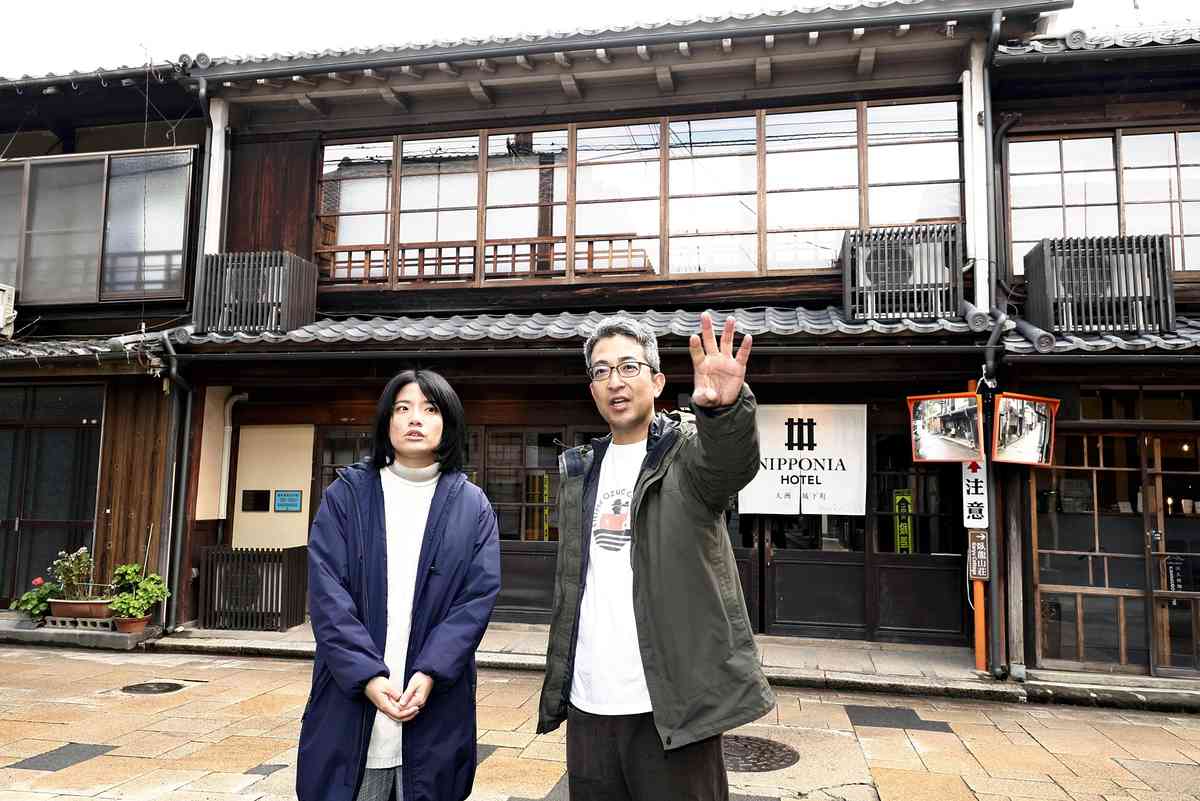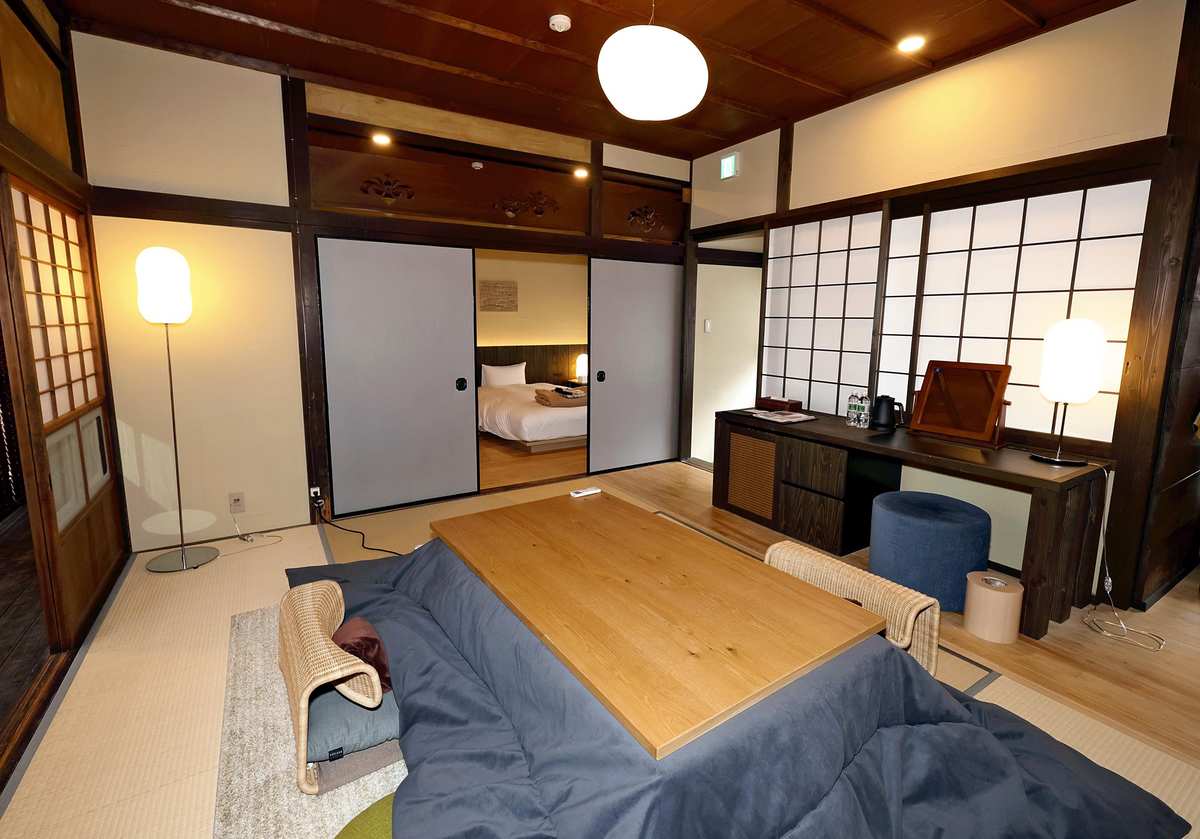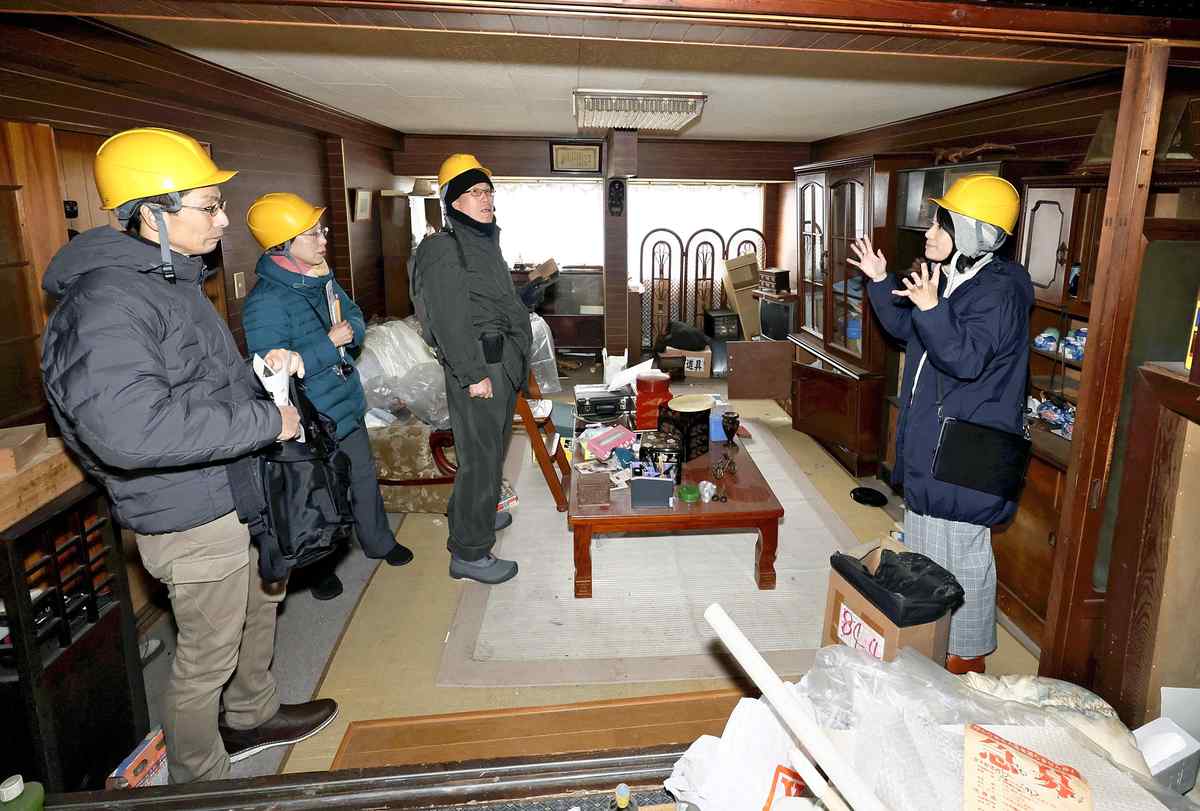Ehime Castle Town Turns Traditional Japanese Houses into Hotels to Preserve Townscape, Attract Tourism

Hsieh Fan, left, and Yosuke Inoue stand in front of an old Japanese house that has been turned into a hotel in Ozu, Ehime Prefecture.
17:23 JST, April 13, 2025
OZU, Ehime — The city of Ozu in Ehime Prefecture, which retains the atmosphere of a castle town from the Edo period (1603-1867), is becoming a popular destination for foreign visitors due to the conversion of old traditional houses into hotels and other facilities, creating a sustainable town.
In recent years, the question of how Ozu should maintain the old traditional houses that form the townscape has become an issue. The city established a system to subsidize house renovation costs to protect the townscape but has found many cases of people who inherited houses from their parents or others struggling to manage the property as they live outside the prefecture. Because of this, more houses had to be demolished.
“The issue can’t be fully solved with conventional measures,” said Hajime Muranaka of the city’s urban development division. “We felt that we would not be able to protect the townscape unless we found a way to do so without placing the burden on homeowners.”
Out of this sense of urgency, the city, a local bank and other parties held a series of study sessions and established the general incorporated association Kita Management in 2018. Kita Management was set up as a destination management/marketing organization (DMO) to handle the renovation of old traditional houses.
According to Kita Management, an affiliate of the association involved in revitalization projects signs a 15-year lease contract with the owner of the old houses and renovates them. The houses are then leased to a hotel management company. There is no financial burden on the homeowners as they receive a rental payment equivalent to the amount of their property taxes. They will also have the houses returned after 15 years.
“In other words, this is a system of preserving the landscape through tourism,” said Yosuke Inoue, a representative of the affiliate. “Good properties would have been torn down if the start of the project had been delayed by even a year.”

A room in an old Japanese house that has been turned into a hotel
The hotel’s target demographic is wealthy visitors from Europe, the United States, Australia and Taiwan. The rooms in the houses were furnished in a refined Japanese style, with marks on a pillar made by carpenters and graffiti from the Edo period left intact to let guests experience the atmosphere of the old times.
Twenty-six houses have been renovated, with their 31 rooms being used as “decentralized hotels.” The front desk and dining areas were installed in other facilities so hotel guests would walk around the town, creating a bustling atmosphere in the area.
The number of foreign visitors to the city almost doubled in fiscal 2023 from about 12,000 in fiscal 2019 before the COVID-19 pandemic.

An employee of Kita Management, right, explains the history of an old Japanese house during a tour showing the process of renovating the house.
A tour that demonstrates the process of renovating the old Japanese houses particularly appeals to tourists. In January, Hsieh Fan, a Kita Management employee from Taiwan, explained to a tour group that old houses in Ozu have tokonoma alcoves and other important features on the second floor since the city is prone to river floods.
Hsieh, who planned the tour, was showing the group a house that still contained household items and told the group that people lived with nature in the past. She wants visitors to know the story behind the beautiful tourist photos.
Kita Management presents their work at residents’ study sessions and at elementary, junior high and high schools. In 2023, the efforts earned the top spot in the Culture and Tradition category of the Green Destinations Story Awards by a Netherlands-based certification organization.
“I think residents’ awareness has changed as well [because of these developments],” Inoue said, adding that more people had begun to ask him if they can do anything in the city.
Inoue hopes to create a virtuous cycle in which the appeal of the city is enhanced and residents regain their pride.
Related Tags
Top Articles in Society
-

Producer Behind Pop Group XG Arrested for Cocaine Possession
-

Man Infected with Measles Reportedly Dined at Restaurant in Tokyo Station
-

Man Infected with Measles May Have Come in Contact with Many People in Tokyo, Went to Store, Restaurant Around When Symptoms Emerged
-

Woman with Measles Visited Hospital in Tokyo Multiple Times Before Being Diagnosed with Disease
-

Australian Woman Dies After Mishap on Ski Lift in Nagano Prefecture
JN ACCESS RANKING
-

Producer Behind Pop Group XG Arrested for Cocaine Possession
-

Japan PM Takaichi’s Cabinet Resigns en Masse
-

Man Infected with Measles Reportedly Dined at Restaurant in Tokyo Station
-

Israeli Ambassador to Japan Speaks about Japan’s Role in the Reconstruction of Gaza
-

Videos Plagiarized, Reposted with False Subtitles Claiming ‘Ryukyu Belongs to China’; Anti-China False Information Also Posted in Japan




















